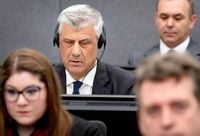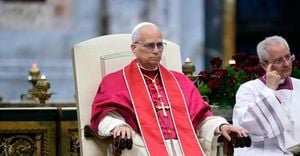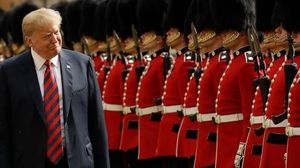On September 15, 2025, the Kosovo Specialist Chambers in The Hague witnessed a pivotal moment in the war crimes trial of former Kosovo President Hashim Thaçi. The defense opened its case with testimony from James Rubin, a former U.S. State Department spokesman and a close aide to Secretary of State Madeleine Albright during the late 1990s. Rubin’s appearance on the stand marked the beginning of a new chapter in a trial that has gripped Kosovo, Serbia, and much of the international community for over two years.
Hashim Thaçi, together with co-defendants Kadri Veseli, Rexhep Selimi, and Jakup Krasniqi, stands accused of war crimes and crimes against humanity committed during Kosovo’s 1998-99 war for independence from Serbia. The charges against them include murder, persecution, torture, and enforced disappearances, with prosecutors holding them individually and as commanders responsible for the deaths of over 100 prisoners at KLA detention facilities in Kosovo and neighboring Albania. The allegations stem from one of the bloodiest chapters in the Balkans, a conflict that claimed the lives of more than 13,000 people, most of them ethnic Albanians.
Rubin’s testimony, as reported by the Associated Press, Balkan Insight, and Reuters, painted a picture of Thaçi not as a military mastermind, but as a political figurehead. Describing his role during the war, Rubin stated, “It was clear to me that he was not in charge. He didn’t have the knowledge, the capabilities or the authority to make decisions in any way, shape or form.” Rubin, who was present at the 1999 Rambouillet peace talks in France and later negotiations on Kosovo’s demilitarization, explained that Thaçi acted more like a foreign minister than a commander. He could sign deals, Rubin said, but “did not have authority to decide on anything.”
According to Rubin, real power within the Kosovo Liberation Army (KLA) lay with battlefield commanders. “They told [Thaçi] what to do, he didn’t tell them what to do,” Rubin emphasized in court. Decisions, especially significant ones, were made by these commanders, who were typically older and wielded much more authority than Thaçi or his fellow political leaders. Rubin’s account echoed the defense’s broader argument: that the KLA was a grassroots movement, and that its senior leaders, including Thaçi, did not exercise direct control over fighters on the ground who may have committed crimes.
This narrative stands in stark contrast to the prosecution’s case. Prosecutors have maintained that Thaçi and his co-defendants were not only aware of crimes committed by KLA fighters but had effective command responsibility. At the trial’s opening on April 3, 2023, prosecution lawyer Clare Lawson told judges, “These four accused are on trial in respect of their personal responsibility for crimes committed against persons whom they viewed as opponents, a majority of whom were in fact their fellow Kosovo Albanians.” The prosecution spent months presenting its case, calling 125 witnesses before resting.
The trial itself is the largest and most high-profile case before the Kosovo Specialist Chambers, a court established in 2015 with international staff to ensure fair proceedings after previous KLA-related trials were marred by witness intimidation. The court and a linked prosecutor’s office were created following a 2011 Council of Europe report that included allegations of organ trafficking and killings by KLA fighters. Notably, Thaçi and his co-defendants are not charged with organ harvesting.
Rubin’s testimony also touched on the broader context of the KLA’s leadership. He described Thaçi and his co-defendants as “moderates” within the movement, intent on finding a solution that would avoid further bloodshed. Under cross-examination, Rubin agreed that Jakup Krasniqi, one of the defendants, was “a supporting voice of moderation who was trying to help his party and those involved, with the help of the United States, to end the conflict.” Rubin further stated that up until 2000, while he was still in the U.S. government, there was no evidence that allegations of crimes against Thaçi or Krasniqi were true.
The trial has been closely watched in Kosovo, where Thaçi and his co-defendants are widely regarded as national heroes for their roles in the fight against Serbian forces. Many Kosovars believe the tribunal is biased against the KLA, a sentiment that was on display the day before Rubin’s testimony, when hundreds of ethnic Albanians and KLA veterans from across Europe and the United States staged a protest rally in The Hague calling for the defendants’ release.
The political situation in Kosovo has added further tension to the proceedings. Seven months after parliamentary elections, the country remains in a state of political stalemate. On September 12, 2025, just days before Rubin’s testimony, the United States—a key supporter of Kosovo—suspended talks with the country, blaming its caretaker government for rising tensions and instability in the region.
Kosovo’s path to independence was marked by violence and international intervention. The 1998-99 conflict ended after a 78-day NATO airstrike campaign against Serbian forces, paving the way for Kosovo’s 2008 declaration of independence. While the United States and many Western nations recognized Kosovo’s sovereignty, Serbia and several other countries have not. The wounds of the war remain fresh for many, and the fate of Thaçi and his co-defendants is deeply entwined with Kosovo’s national identity and its standing on the international stage.
Thaçi himself, known as “The Snake” during the war, rose to political prominence in the post-war years, eventually becoming president. He resigned in October 2020 after his indictment and has been detained in The Hague since then. The defense plans to call 11 witnesses for Thaçi and two for Krasniqi, with the court setting November 14, 2025, as the estimated closing date for the defense case. After closing statements, the judges have 90 days to deliver a verdict, likely in spring 2026.
As the defense presents its case, the central question remains: did Thaçi and his fellow leaders truly wield the command authority required for criminal responsibility, or were they, as Rubin insists, political symbols without real control over the chaos of war? The answer will not only determine their fate but also shape how Kosovo’s struggle for independence is remembered, both at home and abroad.





